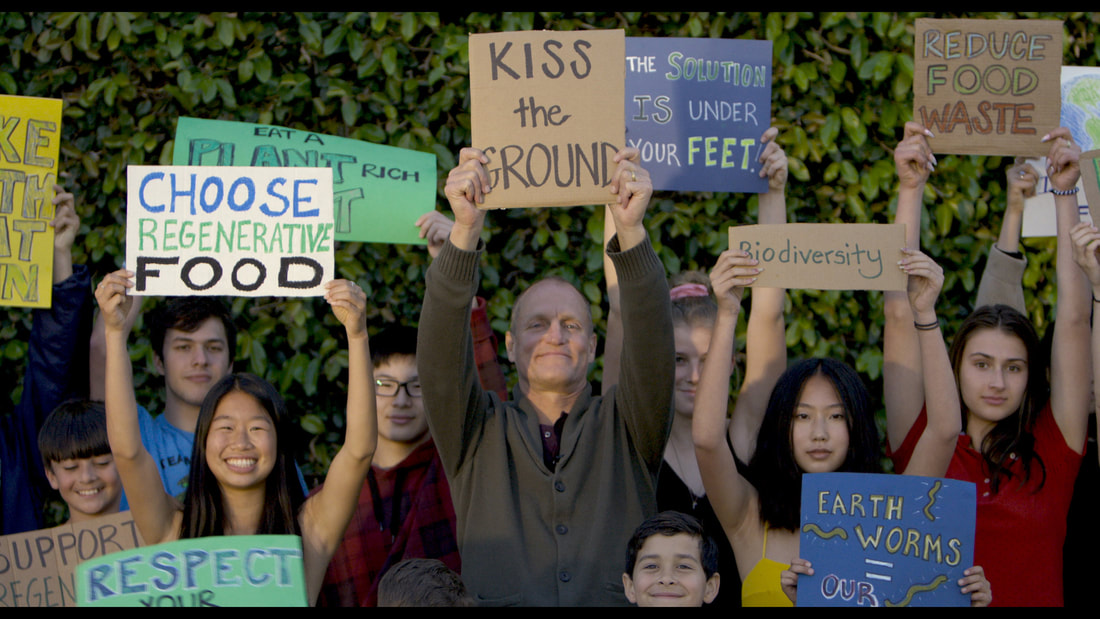|
A still from Joshua Tickell and Rebecca Harrell Tickell's Kiss The Ground (2021) What if there was an alternative path to solve the climate crisis? A simple solution for the here and now, as actor Woody Harrelson narrates, is right under our feet. It’s in the earth around us and the ground beneath us. Somewhere deep in the roots of co-directors Joshua Tickell and Rebecca Harrell Tickell’s documentary Kiss The Ground is an informative intervention about protecting the world’s soil. How soil is a hopeful solution to stabilizing climate, replenish lost ecosystems, and create abundant food supplies. For a while, the focus seems concentrated on various leaders in agriculture. Notably as they present conservation practices to American farms in the hopes of planting a regenerative seed. Inexplicably along the way, the Tickells shift to a sea of eco-conscious celebrities who seem well-meaning, but their presence brings no substance to the down-to-earth message at the core of this climate documentary. Kiss The Ground takes a fact-based approach on practices that gets distracted by conflicting ideas on how best to present them.
Kiss The Ground plants seeds of information on healthy soil and the global issue of massive erosion. Including the origins of chemical toxins and several interviews with modern-day leaders in agriculture, regeneration farming emerges as a critical piece of the climate puzzle. The focus on this piece remains abundantly clear, but what’s missing from the puzzle is the Indigenous origins of regenerative agriculture approaches for several hundred years. Indigenous Americans protected and preserved land through practices that have since advanced sustainable agriculture. Such as permaculture, working with the earth and ground to generate healthy soil. A plethora of star-studded appearances explaining the innovativeness of composting and toasting a return to Eden feels out of touch with the Indigenous history of regenerative agriculture. Soothing as Woody Harrelson’s narration is, one of the key factors for why Kiss The Ground feels disjointed is the unexpected switch to focus on celebrity endorsements. Listing all the names would waste as much time as the documentary does by focusing on their well-intentioned but distracting perspectives. It’s a puzzling choice given the Tickells’ strength rests on following the likes of conservation agronomists and science teams from different parts of the world. While helpful to gather up various sides to the climate crisis response, from farmers and regenerative ranchers to ministry of agriculture leaders, it’s uncertain where a hopeful Jason Mraz song fits in. Not that using one’s platform to spread awareness should necessarily be frowned upon, but there’s a disconnect in using the perspectives of wealthy white people to explain and show the benefits of a practice that’s been done by Indigenous Americans for thousands of years. While faulty in its focus, Kiss The Ground sheds light on how historically, chemical toxins and sprays date back to Germany rebranding chemicals as pesticides for American farms. What emerged was the vicious cycle of industrial agriculture, working against the earth and stripping soil of its nutrients. To break the cycle, the documentary cites regenerative farming to draw down carbon and improve plant growth. As well, the Tickells look to how a city such as San Francisco leads the way in terms of collecting food scraps, turning it into compost, and getting it to farms. There’s a lot of focus on educating farmers and planting the seed of protecting soil’s health in the name of regenerative agriculture. While distracting in its scope, Kiss The Ground does excel at establishing a clear narrative and providing a pathway for people of today to protect future generations. As conveyed in a hopeful concluding montage of the younger generation prepared to appreciate the earth around us and fight for a healthy planet.
0 Comments
Leave a Reply. |
Archives
June 2024
Categories |


 RSS Feed
RSS Feed